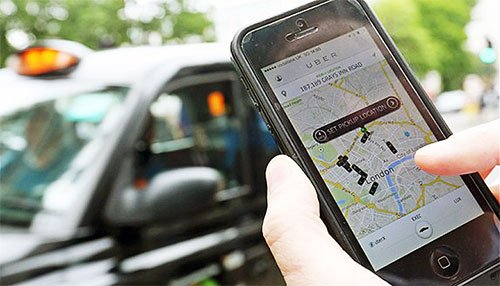Sub-par Uber taxicab drivers meet tough sanctions

Illustration photo
According to Le Hoang Minh, deputy director of the Ho Chi Minh City Transport Department, as of early June 2015, the department had detected and treated 160 cases of sub-par taxicabs fitted with the Uber software, generating fines of about VND671 million ($31,000).
“Most of these taxi drivers using the Uber software were below par in respect to the business conditions and applicable standards set out for the transportation business,” Minh commented.
Of these cases, 69 did not have compulsory business registration certifications and 34 did not carry required taxicab signals.
Minh also said that the city’s Transport Department has just recently received feedback relevant to Uber businesses in the city area from two out of five relevant state management agencies: the Department of Industry and Trade and the Department of Finance.
According to the city’s Department of Industry and Trade, the parental company Dutch-based Uber, has established an online platform similar to an e-commerce transaction floor, allowing ‘people having the demand for hiring a car’ to take the initiative in finding and making transactions with taxicab drivers in the system on their own.
The Ministry of Industry and Trade, which is the state management authority of e-commerce business in Vietnam, is hurriedly building the relevant legal framework to oversee this fresh online transport business in the country.
Meanwhile, the city’s Department of Finance stated that, according to a license granted by the city People’s Committee, Uber Vietnam is a technology trader, not a transport business trader. Therefore, Uber did not engage in fee declaration as required of other transport firms.
While waiting for the final conclusions on the meditation about Uber in the city, the Transport Department proposed city management authorities to urge the city’s Taxation Department to guide Uber Vietnam, as well as its parental company in the Netherlands to strictly adhere to their Vietnamese tax obligations, the Investment Law and relevant guiding documents.
Meanwhile, the city’s Department of Planning and Investment has been tasked with uncovering why Uber Vietnam failed to disclose its business address on its investment certificate granted by the municipal People’s Committee.
“The Planning and Investment Department should provide guidance on whether the Dutch-based Uber, using software for its operations in Vietnam, is entitled to business registration or not,” a source from the Transport Department suggested.
Minh from the city’s Transport Department said that the body will keep a close eye on taxicabs using the Uber software to ensure compliance with the applicable laws and regulations.
“We will surely withdraw the transport business certificates of those Uber partners we find violating business conditions,” Minh asserted.
Uber, an app that connects taxi drivers and taxi firms, has become more and more popular in Vietnam since its debut in June 2014.
Customers just need to download the software from the company’s website to their smartphones. Once they set up their itineraries, Uber provides maps, necessary information, and automatically connects customers with taxi drivers who have joined the Uber network.
Customers can make card payments with Visa and Mastercard. Taxi owners pocket 80 per cent of the revenue, while the remaining 20 per cent goes to Uber.
The fare is VND5,000 for 1km in Hanoi and VND8,000 in Ho Chi Minh City, which is reportedly more than 20 per cent cheaper than official competitors.
What the stars mean:
★ Poor ★ ★ Promising ★★★ Good ★★★★ Very good ★★★★★ Exceptional
Themes: Ride-hailing services
Latest News
More News
- Congratulations from VFF Central Committee's int’l partners to 14th National Party Congress (January 25, 2026 | 09:46)
- List of newly-elected members of 14th Political Bureau announced (January 23, 2026 | 16:27)
- 14th Party Central Committee unanimously elects To Lam as General Secretary (January 23, 2026 | 16:22)
- List of members of 14th Party Central Committee announced (January 23, 2026 | 09:12)
- Highlights of fourth working day of 14th National Party Congress (January 23, 2026 | 09:06)
- Press provides timely, accurate coverage of 14th National Party Congress (January 22, 2026 | 09:49)
- Press release on second working day of 14th National Party Congress (January 22, 2026 | 09:19)
- Minister sets out key directions to promote intrinsic strength of Vietnamese culture (January 22, 2026 | 09:16)
- 14th National Party Congress: Renewed momentum for OVs to contribute to homeland (January 21, 2026 | 09:49)
- Party Congress building momentum for a new era of national growth (January 20, 2026 | 15:00)
















 Mobile Version
Mobile Version